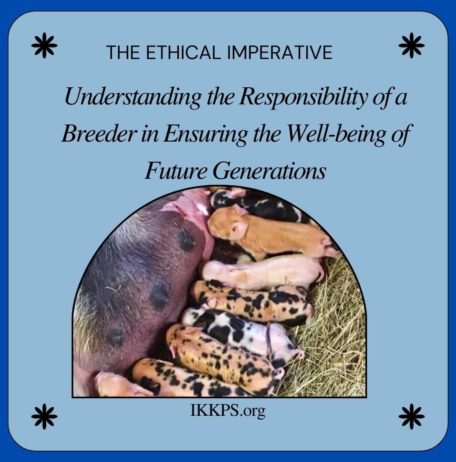
JOIN US
GET OUR KUNEKUNE
NEWSLETTER
New and highly discounted products, fresh and hot stories & useful information
The Ethical Imperative
Ethics of Breeding
Want to breed animals? Along with breeding comes the ethics of breeding to ensure the success of the breed for future generations. It is the responsibility of the breeder to protect this breed from harm. Every animal deserves the best quality of life both now and in the future. It is the responsibility of the breeder to know important information about the breed such as nutrition, health issues, standards, vaccinations, and how to care for their animals correctly. In this article, we discuss the responsibility of a breeder for ethical breeding.

The Ethical Imperative: Understanding the Responsibility of a Breeder in
Ensuring the Well-being of Future Generations
In the world of animal breeding, there exists a profound ethical imperative - the responsibility to ensure the well-being of future generations. This imperative extends far beyond simply producing offspring; it encompasses a deep understanding of the physical, mental, and emotional needs of the animals under our care. The role of a breeder is not just about creating new life, but about shaping the future of a species. It requires a commitment to thoughtful selection, genetic diversity, and responsible breeding practices. A breeder must strive to create healthy and well-adjusted animals, free from genetic defects and behavioral issues. This responsibility demands a high level of knowledge, skill, and dedication. Let us delve into the intricate world of animal breeding, explore the challenges and rewards of upholding this ethical imperative, and understand why it is crucial to prioritize the well-being of future generations.
The importance of ethical breeding practices
Breeding animals is a significant responsibility that should not be taken lightly. Ethical breeding practices are essential to ensure the overall health and well-being of future generations. Breeding without careful consideration can lead to negative consequences such as an increase in genetic disorders and behavioral issues. A responsible breeder understands the importance of maintaining genetic diversity to minimize the risk of hereditary diseases and to promote overall strength within the breed.
Additionally, ethical breeders prioritize the welfare of their animals. They provide proper veterinary care, nutritious diets, and suitable living conditions. They ensure that the animals are not subjected to unnecessary stress or suffering. By adhering to ethical breeding practices, breeders can contribute to the betterment of the breed and enhance the overall quality of future generations. With each generation produced the goal should be to breed offspring that are better than the parents.
The impact of unethical breeding on future generations
Unethical breeding practices can have detrimental effects on future generations of animals. Breeding without considering the long-term consequences can result in a range of health issues, including genetic disorders, weakened immune systems, and reduced lifespan. Furthermore, behavioral problems may arise due to poor socialization or inadequate care during early development.
The repercussions of unethical breeding extend beyond the individual animals. It can perpetuate negative stereotypes and contribute to the overpopulation of certain breeds, leading to overcrowded shelters and the euthanasia of unwanted animals. Luckily with KuneKune pigs, they have another avenue, food to feed your family. Irresponsible breeders often prioritize profit over the well-being of the animals, perpetuating a cycle of suffering and neglect. It is crucial for breeders to recognize the potential harm caused by unethical practices and take responsibility for their contributions to the breed's future.
The role of a responsible breeder in ensuring the well-being of future generations.
A responsible breeder plays a critical role in safeguarding the well-being of future generations of animals. They are committed to preserving and improving the breed, while also prioritizing the health and temperament of their animals. Responsible breeders invest considerable time, effort, and resources into understanding the breed's history, genetics, and potential health risks. Breeders need to know that not every piglet they produce is worthy of breeding. The saying goes, “Sell the best and eat the rest.” It is responsible for breeders to understand that and have a plan in place for those piglets not worthy of being sold as breeding stock. If you cannot eat your KuneKunes, it is important to have a plan in place or a partnership with someone who will utilize them for pork.
Gaining knowledge can be done simply by joining a KuneKune Registry that offers continued education so that you can constantly improve your breeding program. Knowledge is power and knowledge can make the difference in your success or failure in breeding operations, so choose your registry carefully. You want to know how your registry can help you, so it is important to view what they do for you as well.
Breeding for health and genetic diversity
One of the primary responsibilities of a breeder is to prioritize the health of their animals. This involves conducting extensive daily inspections and record keeping identifying and eliminating potential hereditary diseases within the breed. By selectively breeding only healthy individuals, breeders can reduce the occurrence of genetic disorders and promote the overall strength of the breed. In addition to health considerations, responsible breeders also understand the importance of maintaining genetic diversity. Inbreeding can lead to an increased risk of genetic diseases and reduced overall fitness. Breeders who prioritize genetic diversity carefully select breeding pairs to ensure the preservation of desirable traits while minimizing the risk of genetic issues.
This can easily be done with the registry herd book programs. In IKKPS, we allow members and non-members full access to the herd book as we prioritize health and welfare regardless of membership.
Proper socialization and behavioral development
A responsible breeder recognizes the significance of early socialization and behavioral development in their offspring. They provide a nurturing environment that exposes the animals to various stimuli, ensuring they grow up to be well-adjusted and confident individuals. Exposing your offspring to various situations and people can be good for them. While this is more towards dog breeders, it is also important for KuneKunes. KuneKunes naturally enjoy human interactions and there is no better time to start interacting with them than while still nursing their mom. Normally if you receive piglets that after 1-2 days of settling in are still very shy, you know the breeder did not spend much time with them. Again, since they are very social animals it is fairly easy to win over their heart through their stomachs. Offer treats such as grapes, apples, and melons cut up and they will associate you will something pleasant.
Responsible breeders also prioritize ongoing training and support for the new owners of their animals. They provide guidance and resources to ensure that
the animals receive proper care and continue to develop into well-behaved adults.
Providing a nurturing and enriched environment
Creating a nurturing and enriched environment for is vital for their physical and mental development. Responsible breeders provide ample space, appropriate shelter, and regular exercise to promote physical well-being. As KuneKune pigs are grazing animals, it is important to offer them grazing pastures.
Furthermore, responsible breeders ensure that the piglet receives proper nutrition tailored to their specific needs. They collaborate closely with veterinarians to develop a balanced diet that supports healthy growth and development.
Screening potential owners and ensuring responsible ownership.
A responsible breeder goes beyond simply finding suitable homes for their piglets. They carefully screen potential owners to ensure they are committed to
responsible ownership. This includes assessing their knowledge of the breed, their living conditions, and their ability to provide a suitable environment for the animal.
Responsible breeders also provide ongoing support and guidance to new owners, offering advice on housing, fencing, healthcare, and general care. They maintain a lifelong relationship with the owners, always available to address any concerns or help throughout the lifespan of the animal.
The benefits of responsible breeding for both pigs and owners
Responsible breeding practices benefit not only the animals but also their owners. By prioritizing health, temperament, and genetic diversity, responsible breeders produce animals that are more likely to live long, healthy lives. This reduces the chances of costly veterinary bills and emotional distress for the owners.
Furthermore, responsible breeders contribute to the overall improvement of the breed. By focusing on temperament, breed standards, breeding practices, and socialization, they produce animals that are more likely to be well-adjusted and compatible for a variety of niche markets from pork production to breeding programs.
Responsible breeders also play a crucial role in educating the public about the breed, including its characteristics, needs, and potential challenges. This knowledge empowers owners to provide the best possible care for their animals and promotes responsible pet ownership within the community.
Conclusion: The ethical imperative of responsible breeding
The responsibility of a breeder goes far beyond the act of producing offspring. It encompasses a commitment to the well-being of future generations and the preservation and improvement of the breed. Ethical breeding practices prioritize the health, temperament, and overall welfare of the animals, ensuring that they lead happy and fulfilling lives.
By adhering to responsible breeding practices, breeders can minimize the risk of genetic disorders, behavioral issues, and other health problems. They contribute to genetic diversity, promoting the long-term vitality of the breed. Responsible breeders also play a crucial role in educating the public and ensuring that their animals find loving and suitable homes.
The ethical imperative of responsible breeding lies in the hands of breeders. They must uphold the highest standards of care and to prioritize the well-being of future generations. Through their dedication, knowledge, and commitment, responsible breeders shape the future of a species, leaving a lasting legacy of healthy, well-adjusted animals for generations to come.
Registry Office
17500 Hamilton Arms Court Dewitt, VA 23840